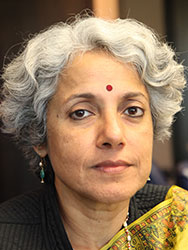
Q and A with former Fogarty trainee Dr Soumya Swaminathan of the Indian Council of Medical Research
January / February 2017 | Volume 16, Issue 1

Photo by Karin Zeitvogel
Soumya Swaminathan, M.B.B.S., M.D.
Former Fogarty trainee Dr. Soumya Swaminathan has been director general of the Indian Council of Medical Research (ICMR) since 2015, overseeing dozens of research centers around India. A pediatrician and clinical scientist known for her tuberculosis research, Dr. Swaminathan is also head of the Department of Health Research at India's Ministry of Health and Family Welfare, and has held numerous other domestic and international posts. She is a lead investigator on an NIH-funded study on tuberculous meningitis and a past member of the TB steering committee of the NIH-supported International Maternal Pediatric Adolescent AIDS Clinical Trials (IMPAACT) network.
What impact has Fogarty had on your career?The training programs I did through Fogarty built my self-confidence and leadership qualities. Through the many people I met, I leaned that, as scientists, we all talk the same language, that nationality is an artificial barrier in the world of science. I view Fogarty as an organization that brings together people of different backgrounds and gets them to speak one language - the language of science.My first experience with Fogarty was a short-term fellowship at UCLA in 2000, working with Dr. John Fahey and his team. I came to the fellowship a pure clinician, and thought I was just going to see patients and learn about clinical research. But instead, Dr. Fahey threw me into a lab and said, “You have to do some hands-on immunology!” So I ended up learning how to do sensitive immune-assays and flow cytometry, learned about immunology, took a course on HIV epidemiology, and did some clinics. It was an amazing eight weeks and I went back to India with lots of ideas for research. Then, in 2008, I attended a summer course on clinical effectiveness, also funded by Fogarty, at the Harvard School of Public Health.How has Fogarty helped to build research capacity in India?Fogarty has been transformative for Indian TB research. With Fogarty support, I've been able to send at least eight of my colleagues from the TB research center to do short-, medium- and long-term training programs in different areas of research - from nutrition to pharmacology and pharmacokinetics, to behavioral and social science research, to immunology. All of these people have come back enriched, and all of them are now principal investigators in their own right. Now, we have a multidisciplinary group that's doing all kinds of different research and getting their own grants.How do you see the future of U.S.-India research collaboration?It's a partnership of equals, in which both sides have a lot to learn from each other. The Indian research community brings a lot of clinical experience and material to the partnership, as well as the very good insights of many Indian doctors. A key strength that the U.S. brings to the partnership is its system, which allows researchers to combine clinical work with basic science pathogenesis. In addition, I've always been struck by Americans' willingness to collaborate across disciplines, across universities and across centers. That's a page we should take out of their book.We're making good progress with streamlining some of our regulatory processes in India, which, in the past, may have been a hurdle for international collaborative projects. The ICMR is engaged with a number of centers at the NIH.How can India and the U.S. grow international collaboration?I'd love to see Fogarty stimulate and support south-south partnerships - say between India and Africa, or India and other Southeast Asian countries. I believe it's vital for researchers from different countries to pool their financial resources, knowledge and different areas of expertise to help make progress against diseases.To that end, I'm working to set up a consortium that brings researchers from different parts of the world to India to work together to address questions related to TB, which is still a major public health issue. India and five other countries - China, Indonesia, Nigeria, Pakistan and South Africa - accounted for 60 percent of the 10.4 million new tuberculosis cases in 2015, so they're on the front lines of the fight against the disease.If we have international collaboration on TB, instead of people working in silos and possibly duplicating research, they would come together and pool not only financial resources but also all different kinds of expertise - from genomics and immunology to the insights gained by working in rural areas and seeing TB patients every day. Global consortia like the ones we're setting up in India are essential if we are to make progress against diseases like TB.
More Information
- Indian Council of Medical Research (ICMR)
- NIH grant: Innovative PK/PD Approaches to Optimize TBM treatment in children (Patch Study)
Dr. Swaminathan is a co-Principal Investigator - NIH-supported International Maternal Pediatric Adolescent AIDS Clinical Trials (IMPAACT) network
To view Adobe PDF files, download current, free accessible plug-ins from Adobe's website.





















.png)









No hay comentarios:
Publicar un comentario